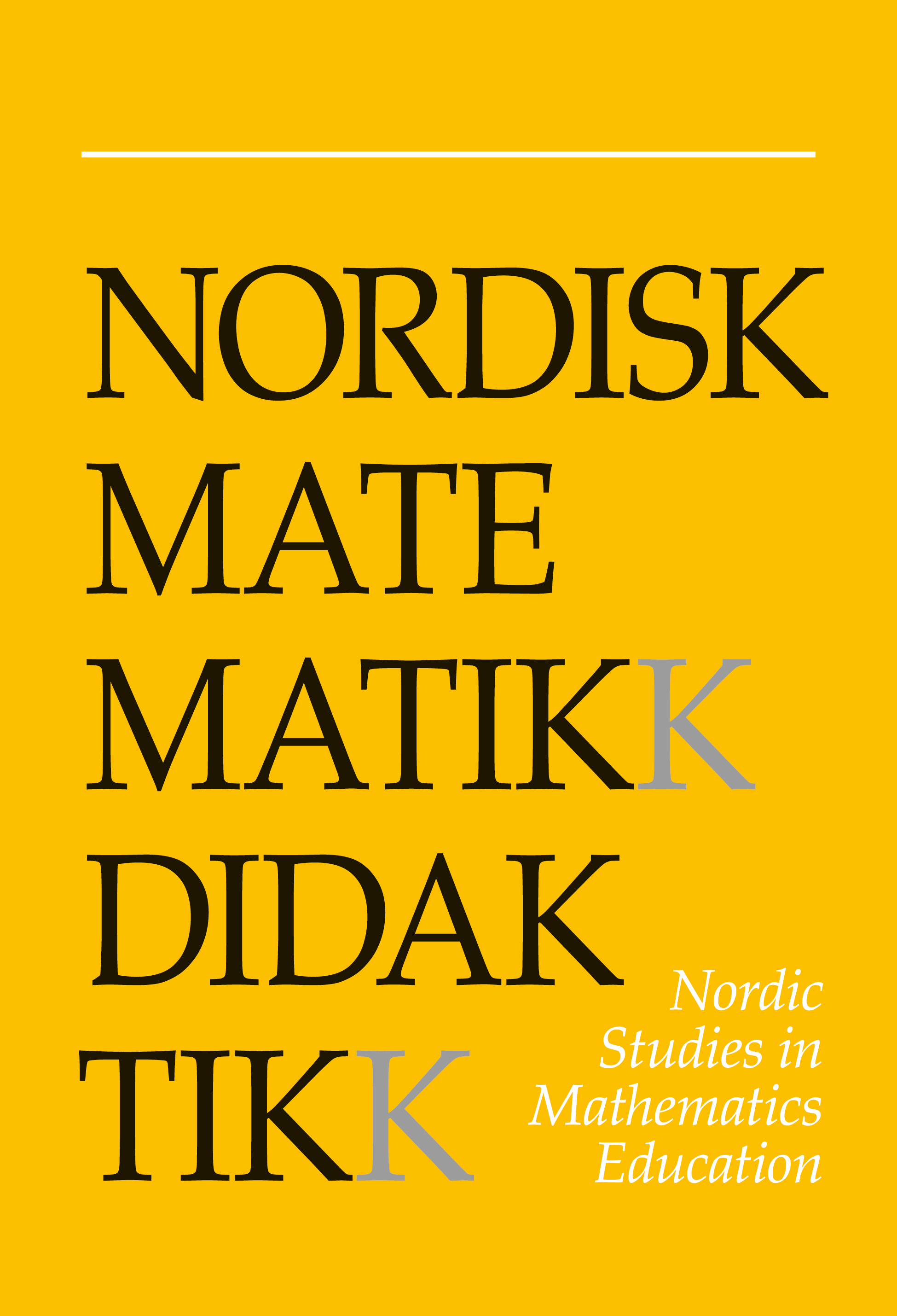What characterises mathematical conversations in a Norwegian kindergarten?
DOI:
https://doi.org/10.7146/nomad.v21i4.148750Abstract
This paper presents a study of young children’s mathematical conversations in a Norwegian kindergarten and provides examples to illustrate some of their characteristics. Using points made in previous research about conversations and mathematics, an analysis of an interaction involving a group of children who are putting a toy together exemplifies what can and what cannot be considered a mathematical conversation. For a conversation to be considered mathematical, it is suggested that it must include not only references to mathematics, but also specific structural elements in the conversation, as well as valuing participants’ contributions and encouraging participants to reflect on the mathematical theme, thereby promoting learning.
References
Bishop, A. J. (1988a). Mathematical enculturation: a cultural perspective on mathematics education. Dordrecht: Kluwer Academic Publisher.
Bishop, A. J. (1988b). Mathematics education in its cultural context. Educational Studies in Mathematics, 19 (2), 179-191. https://doi.org/10.1007/BF00751231
Carlsen, M. (2010). Orchestrating mathematical activities in the kindergarten: the role of inquiry. Nordic Studies in Mathematics Education, 15 (3), 51-72.
Carlsen, M., Erfjord, I. & Hundeland, P. S. (2010). Orchestration of mathematical activities in the kindergarten: the role of questions. In V. Durand-Guerrier, S. Soury-Lavergne & F. Arzarello (Eds.), Proceedings of the sixth Congress of the European Society for Research in Mathematics Education (CERME 6) (pp. 924-933). Universitè de Lyon.
Ferrara, K., Hirsh-Pasek, K., Newcombe, N. S., Golinkoff, R. M. & Lam, W. S. (2011). Block talk: spatial language during block play. Mind, Brain, and Education, 5, 143-151. https://doi.org/10.1111/j.1751-228X.2011.01122.x
Gjems, L. (2009). Å samtale seg til kunnskap. Sosiokulturelle teorier om barns læring om språk og gjennom språk [To converse to knowledge. Socio-cultural theories about children's learning about language and through language]. Bergen: Fagbokforlaget.
Gjems, L. (2013). Promoting children's language learning and cooperation on knowledge construction in everyday conversations in kindergarten. Teaching and Teacher Education, 29, 39-45. https://doi.org/10.1016/j.tate.2012.08.008
Jaworski, B. (2005). Learning communities in mathematics: creating an inquiry community between teachers and didacticians. Research in Mathematics Education, 7 (1), 101-119. https://doi.org/10.1080/14794800008520148
Jaworski, B. (2007). Theoretical perspectives as a basis for research in LCM and ICTML. In B. Jaworski, A. B. Fuglestad, R. Bjuland, T. Breiteig, S. Goodchild & B. Grevholm (Eds.), Læringsfelleskap i matematikk - learning communities in mathematic (pp. 121-138). Bergen: Caspar Forlag.
Johansson, M. L., Lange, T., Meaney, T., Riesbeck, E. & Wernberg, A. (2012, July). What maths do children engage with in Swedish preschools? Paper presented in Topic study group 1 (Mathematics education at preschool level) at ICME-12, Seoul. Retrieved from http://ltu.diva-portal.org/smash/get/diva2:1006107/FULLTEXT01.pdf
Kennewell, S. (2001). Using affordances and constraints to evaluate the use of information and communications technology in teaching and learning. Journal of Information Technology for Teacher Education, 10 (1-2), 101-116. https://doi.org/10.1080/14759390100200105
Kunnskapsdepartementet (2006). Rammeplan for barnehagens innhold og oppgaver. Oslo: Kunnskapsdepartementet.
Lindfors, J. W. (1999). Children's inquiry: using language to make sense of the world. New York: Teachers College Press.
Magne, O. (2003). Barn oppdager matematikk: aktiviteter for barn i barnehage og skole [Children discovering mathematics: activities for children in kindergarten and school]. Klepp stasjon: Info vest forlag.
Matre, S. (2000). Samtalar mellom barn. Om utforsking, formidling og leik i dialogar [Conversations between children. About exploration, communication and play in dialogs]. Oslo: Det Norske Samlaget.
Macmillan, A. (1998). Pre-school children's informal mathematical discourses. Early Child Development and Care, 140 (1), 53-71. https://doi.org/10.1080/0300443981400105
Nunes, T. & Bryant, P. (1996). Children doing mathematics. Oxford: Blackwell.
Säljö, R. (2000). Lärande i praktiken. Ett sosiokulturelt perspektiv. Stockholm: Prisma.
Vygotsky, L. (1978). Mind in society: the development of higher psychological processes. Cambridge: Harvard University Press.
Vygotsky, L. (2001). Tenkning og tale [Thinking and speech]. Oslo: Gyldendal Norsk Forlag AS.
Wells, G. (1999). Dialogic inquiry: toward a sociocultural practice and theory of education. New York: Cambridge University Press. https://doi.org/10.1017/CBO9780511605895
Wood, D. J., Bruner, J. S. & Ross, G. (1976). The role of tutoring in problem solving. Journal of Child Psychiatry and Psychology, 17 (2), 89-100. https://doi.org/10.1111/j.1469-7610.1976.tb00381.x
Downloads
Published
How to Cite
Issue
Section
License

This work is licensed under a Creative Commons Attribution-NonCommercial-ShareAlike 4.0 International License.



